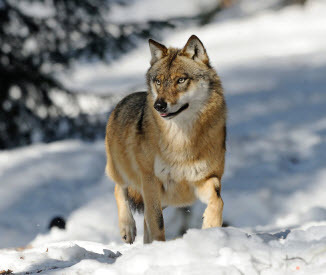Posted:
Michigan's wolves, once reduced to less than a handful by the 1970s, are now squarely in the crosshairs of eager hunters and politicians hoping to destroy as many as they can under a thin -- and sometimes fictional -- justification of threats to livestock and humans. Before we take lethal aim at these relatively defenseless and innocent animals, there's good cause for a reality-check, because the reality is: There's simply no good reason to hunt these wolves.
 Protected
since 1973 under the Endangered Species Act, Michigan wolves were
delisted at the start of 2012. By the end of that year, Governor Rick
Snyder signed legislation declaring them fair game for hunting. Why?
Protected
since 1973 under the Endangered Species Act, Michigan wolves were
delisted at the start of 2012. By the end of that year, Governor Rick
Snyder signed legislation declaring them fair game for hunting. Why?Because...
Because....
Well, that's a tough question to answer. Yes, there are now more than 650 wolves in Michigan. But charges that wolves have ventured onto residential porches or daycare centers -- or are killing livestock frequently -- are not passing the truth test. In some cases, entire stories about wolf incidents are being retracted.
What is true: Michigan farmers, ranchers and other landowners are already permitted to kill wolves to protect livestock or dogs, even though cases of wolves killing livestock are relatively rare. Ranchers are also compensated for livestock losses from wolves.
There has also never been a single record of a wolf attack on a human in Michigan. In fact, wolves are fearful of people, and avoid them. (Rightfully so.)
What's more, in other Great Lakes states, wolves are often trapped inhumanely, sometimes with steel-jawed traps in which animals can suffer for days before being killed.
This leaves only one motive: killing wolves merely for sport, thrill, out of hatred, and for trophies -- which is what brought wolves to the brink of extinction in the first place.
Some Michigan politicians, hell-bent on opening trophy hunting season, will take any legislative or regulatory means necessary to allow the killing of wolves -- even if it means going against the will of their own citizens. Michigan residents have fought to protect wolves through referendums, yet influential pro-hunting groups have found new ways to thwart the public's voice. And it's time once again to put up a fight to protect their lives.
In March, 2013, more than a quarter of a million Michigan citizens signed a petition calling for a referendum to undo the call to arms and protect the wolves, as well as to postpone wolf-hunting season until after the 2014 election.
Unmoved, the Michigan legislature gave the unelected Natural Resources Commission (NRC) the authority to determine which animals can be hunted. Being a regulatory body, the NRC's decisions are not reversible by public vote. With its new power, the NRC approved the wolf hunt in July.
To preserve these animals' lives, the Michigan public needs to overturn two critical laws in November: PA 520, the law which put wolves on the list of "game species"; and PA 21, which grants the NRC the authority to add animals to that list. These two laws both have the same deadly effect: to kill wolves.
Rejecting these measures will effectively stop the senseless hunting and trapping of wolves, and ensure that important issues about Michigan wildlife will still be influenced by the electoral voice of Michigan voters.
The group Keep Michigan Wolves Protected is collecting signatures from registered Michigan voters to put the PA 21 referendum on the ballot alongside the one related to PA 520, so that both can be overturned and wolves can be protected. The deadline to submit signatures is March 12th. If you live and vote in Michigan, I hope you'll consider adding your name to this cause.
In the end, these wolves are not nearly the threat to humans as some of us humans are to our own humanity. Too often -- as in this case -- the truth is deliberately obscured by individuals and institutions guided solely by self-interest and profit.
When that happens, animals are not the only ones who pay the price. We all do.
Matthew Bershadker is President & CEO of the American Society for the Prevention of Cruelty to Animals (ASPCA). Learn more about the ASPCA's mission and programs at ASPCA.org.
source

No comments:
Post a Comment